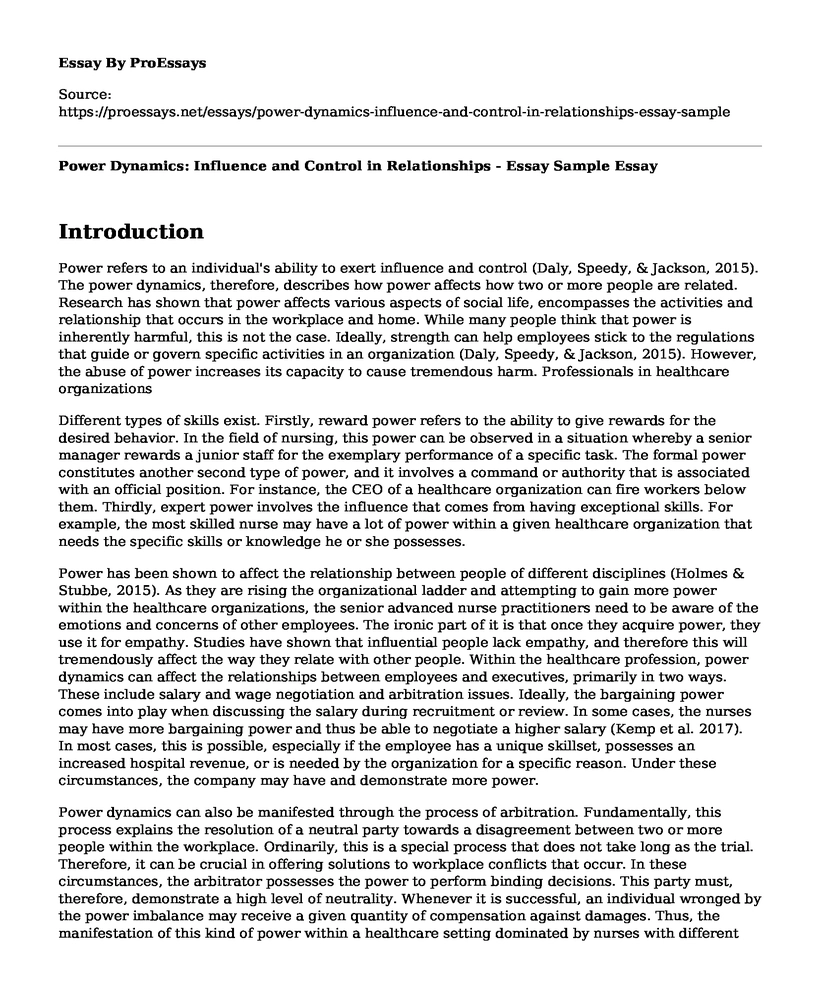Introduction
Power refers to an individual's ability to exert influence and control (Daly, Speedy, & Jackson, 2015). The power dynamics, therefore, describes how power affects how two or more people are related. Research has shown that power affects various aspects of social life, encompasses the activities and relationship that occurs in the workplace and home. While many people think that power is inherently harmful, this is not the case. Ideally, strength can help employees stick to the regulations that guide or govern specific activities in an organization (Daly, Speedy, & Jackson, 2015). However, the abuse of power increases its capacity to cause tremendous harm. Professionals in healthcare organizations
Different types of skills exist. Firstly, reward power refers to the ability to give rewards for the desired behavior. In the field of nursing, this power can be observed in a situation whereby a senior manager rewards a junior staff for the exemplary performance of a specific task. The formal power constitutes another second type of power, and it involves a command or authority that is associated with an official position. For instance, the CEO of a healthcare organization can fire workers below them. Thirdly, expert power involves the influence that comes from having exceptional skills. For example, the most skilled nurse may have a lot of power within a given healthcare organization that needs the specific skills or knowledge he or she possesses.
Power has been shown to affect the relationship between people of different disciplines (Holmes & Stubbe, 2015). As they are rising the organizational ladder and attempting to gain more power within the healthcare organizations, the senior advanced nurse practitioners need to be aware of the emotions and concerns of other employees. The ironic part of it is that once they acquire power, they use it for empathy. Studies have shown that influential people lack empathy, and therefore this will tremendously affect the way they relate with other people. Within the healthcare profession, power dynamics can affect the relationships between employees and executives, primarily in two ways. These include salary and wage negotiation and arbitration issues. Ideally, the bargaining power comes into play when discussing the salary during recruitment or review. In some cases, the nurses may have more bargaining power and thus be able to negotiate a higher salary (Kemp et al. 2017). In most cases, this is possible, especially if the employee has a unique skillset, possesses an increased hospital revenue, or is needed by the organization for a specific reason. Under these circumstances, the company may have and demonstrate more power.
Power dynamics can also be manifested through the process of arbitration. Fundamentally, this process explains the resolution of a neutral party towards a disagreement between two or more people within the workplace. Ordinarily, this is a special process that does not take long as the trial. Therefore, it can be crucial in offering solutions to workplace conflicts that occur. In these circumstances, the arbitrator possesses the power to perform binding decisions. This party must, therefore, demonstrate a high level of neutrality. Whenever it is successful, an individual wronged by the power imbalance may receive a given quantity of compensation against damages. Thus, the manifestation of this kind of power within a healthcare setting dominated by nurses with different philosophies and ideas of work may help solve any possible disagreements that may occur as a result.
References
Daly, J., Speedy, S., & Jackson, D. (2015). Leadership and Nursing: Contemporary Perspectives. Elsevier Health Sciences.
Holmes, J., & Stubbe, M. (2015). Power and politeness in the workplace: A sociolinguistic analysis of talk at work. Routledge.
Kemp, E., Bui, M., Krishen, A., Homer, P. M., & LaTour, M. S. (2017). Understanding the power of hope and empathy in healthcare marketing. Journal of Consumer Marketing, 34(2), 85-95.
Cite this page
Power Dynamics: Influence and Control in Relationships - Essay Sample. (2023, Mar 23). Retrieved from https://proessays.net/essays/power-dynamics-influence-and-control-in-relationships-essay-sample
If you are the original author of this essay and no longer wish to have it published on the ProEssays website, please click below to request its removal:
- Essay Example on Lieutenant Colonel Adam and His Leadership Style
- Setting and Achieving Goals Essay
- Minority Influence and Social Change Essay Example
- Essay Sample on Infant Temperament: Parent Report & Direct Observation
- Essay on Private vs Public Entities: Service Delivery & Decision-Making
- Essay on My Four-and-a-Half-Year-Old Cousin's Remarkable Conversation Skills
- Paper Example on Enhancing Interpersonal and Communication Skills: My Work History







